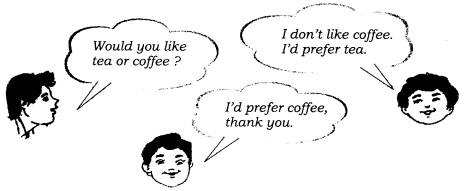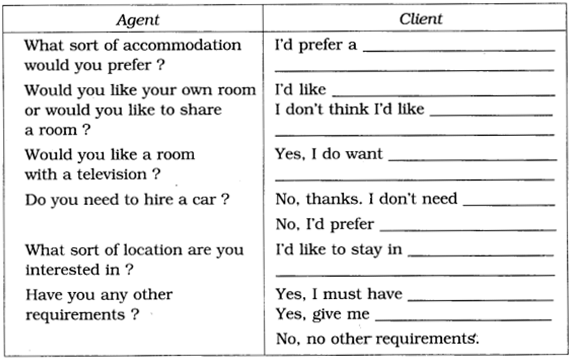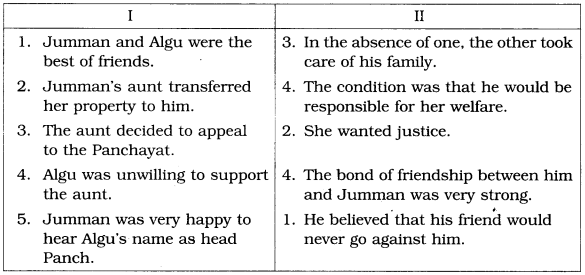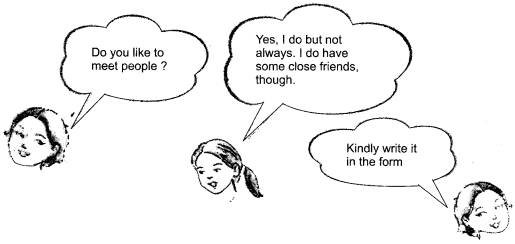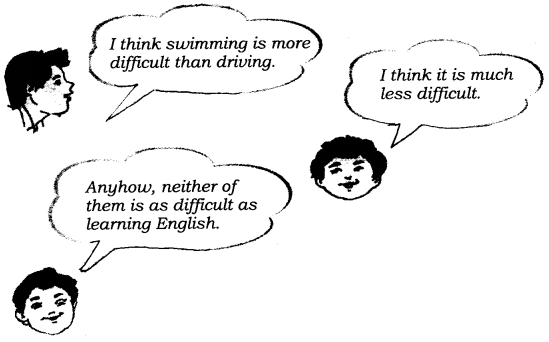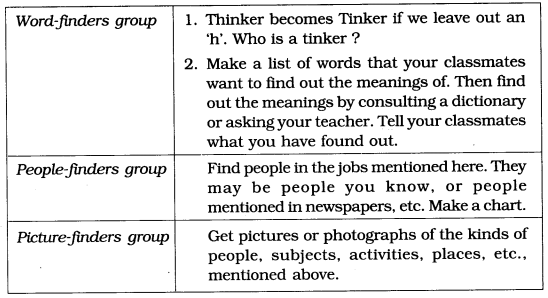NCERT Solutions for Class 6 English Honeysuckle Poem Chapter 3 The Quarrel are part of NCERT Solutions for Class 6 English. Here we have given NCERT Solutions for Class 6 English Honeysuckle Poem Chapter 3 The Quarrel.
| Board | CBSE |
| Textbook | NCERT |
| Class | Class 6 |
| Subject | English Honeysuckle Poem |
| Chapter | Chapter 3 |
| Chapter Name | The Quarrel |
| Number of Questions Solved | 15 |
| Category | NCERT Solutions |
NCERT Solutions for Class 6 English Honeysuckle Poem Chapter 3 The Quarrel
Stanzas For Comprehension
Read the following extracts and answer the questions that follow choosing the best option from among the given ones.
1.
I quarrelled with my brother
I don’t know what about,
One thing led to another
And somehow we jell out.
The start of it was slight,
The end of it was strong,
He said he was right,
I knew he was wrong !
Word – Notes : Black – unhappy, कष्टकारी। Thumped – hit hard, जोर से मारा।
हिन्दी अनुवाद : हम एक दूसरे से घृणा करते थे। तीसरा प्रहर बुरा बीता। फिर अचानक मेरे भाई ने मेरी पीठ पर धौल जमाया और बोला, “अरे, आओ भी हम सारी रात इस तरह नहीं बिता सकते। ग़लती मेरी थी।” अतः वह सही था।
Paraphrase :
I quarrelled with my brother. I don’t know the reason. One thing led to another. Somehow it ended in the quarrel. It started as a small matter but it ended bitterly. He said that he was right. I was sure of his being wrong.
Multiple Choice Questions.
1.
The Passage has been taken from the poem
(a) A House, A Home
(b) The Kite
(c) The Quarrel
(d) Beauty
2.
The author of the above poem is
(a) L.M. Halli
(b) Harry Behn
(c) Eleanor Farjeon
(d) Y-Yeh-Shure
3.
It seems that the brothers quarrelled on
(a) a petty matter
(b) some very important matter
(c) money matter
(d) property
4.
Both the brothers felt that the other was
(a) right
(b) wrong
(c) honest
(d) dishonest
5.
The phrase ‘fell out’ means that the brothers
(a) fell on the ground
(b) fell from the roof
(c) fell on the road
(d) became unfriendly
Answers :
- (c) The Quarrel
- (c) Eleanor Farjeon
- (a) a petty matter
- (b) wrong
- (d) became unfriendly
2.
We hated one another.
The afternoon turned black.
Then suddenly my brother
Thumped me on the back,
And said, “Oh come along !
We can’t go on all night –
I was in the wrong. ”
So he was in the right.
Word – Notes : Black – unhappy, कष्टकारी। Thumped – hit hard, जोर से मारा।
हिन्दी अनुवाद : हम एक दूसरे से घृणा करते थे। तीसरा प्रहर बुरा बीता। फिर अचानक मेरे भाई ने मेरी पीठ पर धौल जमाया और बोला, “अरे, आओ भी हम सारी रात इस तरह नहीं बिता सकते। ग़लती मेरी थी।” अतः वह सही था।
Paraphrase :
We hated each other. Afternoon passed in a bitter mood. Then, all of a sudden, my brother hit me strongly on my back and said. “Come on! This can’t go on all night. I admit my mistake.” Thus he was right.
Multiple Choice Questions.
1.
Those who hated one another were
(a) friends
(b) enemies
(c) brothers
(b) strangers
2.
The afternoon turned black because the two of them
(a) were angry
(b) were disappointed
(c) had lost the way
(d) had quarrelled
3.
The initiative to end the quarrel was taken by
(a) the speaker
(b) the speaker’s brother
(c) their mother
(d) their father
4.
The one in the wrong was
(a) the speaker
(b) the speaker’s brother
(c) neither of the brothers
(d) a third person
5.
The word ‘thumped’ means the same as
(a) hit hard
(b) put hand on
(c) turned
(d) massaged
Answers :
- (c) brothers
- (d) had quarrelled
- (b) the speaker’s brother
- (c) neither of the brothers
- (a) hit hard
Textual Questions
Working with the Poem
Question 1.
With your partner try to guess the meaning of the underlined phrases.
- And somehow we fell out.
- The afternoon turned black.
Answer :
- And there was something on which we quarrelled.
- The afternoon became unpleasant and bad.
Question 2.
Read these lines from the poem :
- One thing led to another
- The start of it was slight
- The end of it was strong
- The afternoon turned black
- Thumped me on the back
Discuss with your partner what these lines mean.
Answer :
- The quarrel began from a certain point and then they quarrelled on some other point and so on.
- It had all started on some very petty matter.
- The malice which it generated was, however, strong.
- The afternoon time passed in great tension.
- Patted me on the back with a show of affection.
Question 3.
Describe a recent quarrel that you have had with your brother, sister or friend. How did it start ? What did you quarrel about ? How did it end ?
Answer :
Recently, I had a quarrel with my best friend Ramesh. It was over a small thing. I had asked Ramesh to accompany me to the Railway Station where I had to go to receive a visitor. Ramesh refused. I went alone but later on I did not speak to Ramesh in the class. He needed my help in his homework but I refused to help him. He was very angry and he too stopped talking to me.
Two days passed, we were on the playground playing cricket. Suddenly a ball hit me and I fell down. Ramesh ran, took me on his scooter to the doctor and then brought me home. I thanked Ramesh and we were friends again.
We hope the NCERT Solutions for Class 6 English Honeysuckle Poem Chapter 3 The Quarrel help you. If you have any query regarding NCERT Solutions for Class 6 English Honeysuckle Poem Chapter 3 The Quarrel, drop a comment below and we will get back to you at the earliest
